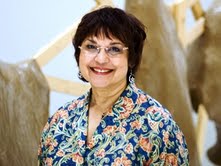Lalita Noronha
 Born in India, Lalita Noronha has a Ph.D. in Microbiology and is a science teacher, writer, poet, and fiction editor for The Baltimore Review. Her literary prose and poetry has appeared in over sixty-five journals, magazines and anthologies. She has twice received the Maryland Literary Arts Award, an Individual Artist Award, and a National League of American Pen Women Award, among others. She is the author of a short story collection, “Where Monsoons Cry.” Her website is http://www.lalitanoronha.com.
Born in India, Lalita Noronha has a Ph.D. in Microbiology and is a science teacher, writer, poet, and fiction editor for The Baltimore Review. Her literary prose and poetry has appeared in over sixty-five journals, magazines and anthologies. She has twice received the Maryland Literary Arts Award, an Individual Artist Award, and a National League of American Pen Women Award, among others. She is the author of a short story collection, “Where Monsoons Cry.” Her website is http://www.lalitanoronha.com.
The Python
At eighteen, in school, when boys and girls
strolled beneath tamarind trees,
sorrow swallowed me like a python takes a rat, head first.
At noon in the zoology department,
I stood beside the python’s cage,
watched his beady eyes, squashed head.
Coiled tight like a fat rope,
he lay oblivious of my eyes
counting scales, marking hues.
I waited till the keeper came,
bearing in a sack, a thrashing rat
he poured into the cage.
How it darted, climbed walls,
slipped, scurried, crouched, froze—
as the fat rope uncurled, slithered, moved.
On the floor the empty sack lay in folds,
the python undulating,
a single hump below its head.
Butterfly
Even in pale light, his eyes ignite her skin,
dark and sweet as brown sugar,
the vein in his neck throbbing
like a gecko’s heart.
She turns slowly, shows no eyes,
no pencil thin or full lips,
just her translucent face, a yolk-less egg
held high to a beam of light.
Like a glinting sword,
she lets the moment hang between them,
the vein in her temple trembling
like a butterfly’s heart.
Waimangu Valley, New Zealand
(for my daughter)
What lay before us was born of violence—
great rocks of molten lava, boiling mud,
black scalding water had rumbled, roared,
exploded from the belly of the earth, swallowed life whole.
But now, winding our way down red cliffs of clay,
streaks of yellow sulfur, flecks of silica,
we pause—beside an emerald pool, blue-green algae,
panga trees, whistling tuis, black swans.
And as mists drift apart,
in the mineral waters, volcanic ash,
we find at last
the fertile ground of forgiveness.